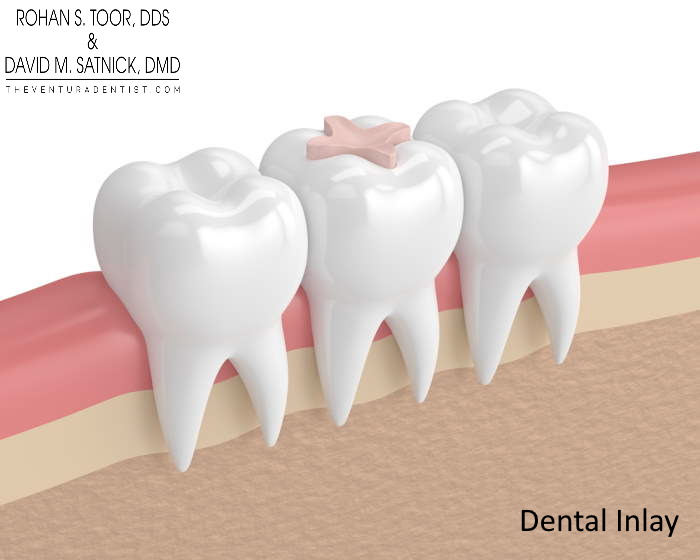
Dental inlays are a suitable option when a tooth requires a large filling due to fracture, decay, or breakage. However, like most dental restorations, inlays are not always permanent and may someday require replacement. Despite this, inlays are highly durable and can last for many years, helping to maintain a beautiful, long-lasting smile. Rohan Toor Dental Care and Dr. Rohan Toor have extensive experience in performing dental inlay procedures, with 5 years of experience.
What is a Dental Inlay?
A dental inlay is a prefabricated filling that is used to repair a severely decayed or broken tooth. An inlay is a single, strong restoration that is designed to precisely fit the contours of a cavity. The pits and crevices that an inlay covers are located between the cusp tips of a tooth's chewing surface.
How is a Dental Inlay done?
The dental inlay procedure involves restoring the tooth by putting a custom-made filling in the affected region of your mouth. The technique aids in the preservation of the damaged tooth and the prevention of further deterioration.
- The decay is carefully removed without getting into the tooth's pulp chamber.
- A temporary filling is placed.
- A final inlay is custom-made at a dental lab to fit perfectly.
- A temporary filling is removed and the final inlay is cemented in place.
Make an Appointment with Dr. Rohan Toor at Rohan Toor Dental Care to see if you need Dental Inlay.
* FREE Tooth Inlay Consultation ($100 Value)
* FREE Digital X-rays especially for Porcelain Inlay ($150 Value)
* We Maximize your Insurance so you pay less out of pocket.
What are Dental Inlays made of?
- Gold - Known for its durability and gentle nature to opposing tooth surfaces, but doesn't have the natural tooth color.
- Porcelain - Offers the best esthetic results if the treatment area is visible when smiling, but may cause wear on opposing teeth if a patient clenches or grinds his or her teeth.
- Composite resin - Less commonly used than porcelain and gold, but may be an option as an alternative to traditional dental fillings due to its added strength and ability to fill larger cavities effectively.
- Ceramic - Made from stronger and more durable materials than fillings and crowns, they typically last longer and provide additional strength and support to damaged teeth, but it is more expensive than other materials.
When is a Dental Inlay Needed?
Dental inlays are a form of restorative dentistry used to repair broken, cracked, or decayed teeth that are not severe enough to require a full crown. They are typically used for minor to moderate damage to the back teeth.
How Long Does a Dental Inlay Last?
According to the Journal of Esthetic and Restorative Dentistry, the lifespan of a dental inlay is typically 6-8 years. The life of your restorations can be prolonged as long as proper aftercare and guidelines are followed.
What are the Advantages of Dental Inlays?
- Dental Inlays offer additional strength and support for the affected teeth.
- Dental inlays preserve tooth structure, compared to crowns which require more tooth removal.
What are the Disadvantages of Dental Inlays?
- Dental inlays are time-consuming to prepare and insert.
- Dental inlays are more expensive than fillings and roughly the same as crowns.
- Dental inlays are not the restoration of choice if you grind your teeth unless made with gold.
What are the Aftercare Tips for Porcelain Inlays?
- Brush your teeth twice a day to remove food particles and oral bacteria's acid.
- Floss at least once a day to clean interdental spaces.
- Use mouthwash to clean areas that flossing and brushing may miss.
How much does a Dental Inlay cost?
The cost of a dental inlay treatment ranges from $650 to $1,200 per tooth. However, most insurance plans cover all or a portion of the cost, as the procedure is meant to repair damaged teeth.
FAQs for Dental Inlay
Does getting an Inlay hurt?
No, the dental inlay procedure is not painful. Your dentist will administer a local anesthetic to numb the area before removing decay from the tooth and placing the inlay.
Are Dental Inlays worth it?
Yes, dental inlays provide additional strength and support to the affected tooth, allowing it to withstand more pressure and chew more efficiently.
Areas We Serve